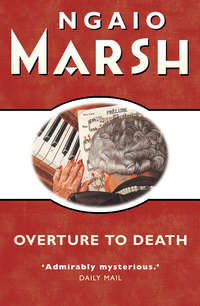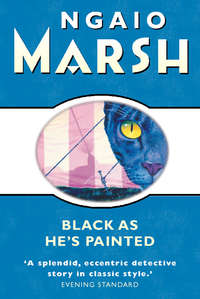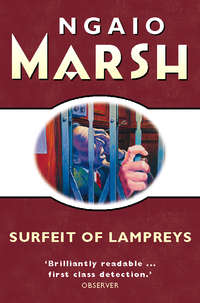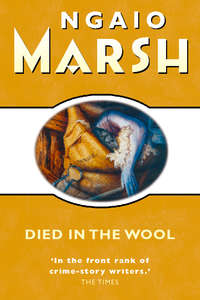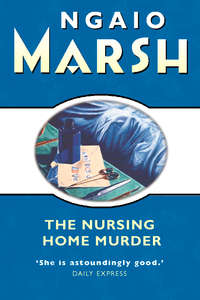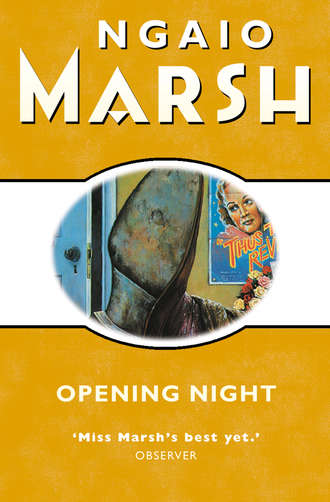
Полная версия
Opening Night
He glanced round the room. ‘Looks nice,’ he said. ‘Are you pressed and shook out? Yes, I can see you are. Flowers too. Very nice. Would you be a friend of hers? Doing it to oblige, like?’
‘No, no. I’ve never seen her. Except in the pictures, of course.’
‘Is that a fact?’ His rather bird-like eyes were bright with speculation. ‘Young ladies,’ he said, ‘have to turn their hands to all sorts of work these days, don’t they?’
‘I suppose so. Yes.’
‘No offence, I hope, but I was wondering if you come from one of these drama schools. Hoping to learn a bit, watching from the side, like.’
A kind of sheepishness that had hardened into obstinacy prevented her from telling him in a few words, why she was there. The impulse of a fortnight ago to rush to somebody – the ship’s captain, the High Commissioner for her own country, anyone – and unload her burden of disaster, had given place almost at once to a determined silence. This mess was of her own making, she had decided, and she herself would see it out. And throughout the loneliness and panic of her ordeal, to this resolution she had stuck. It had ceased to be a reasoned affair with Martyn: the less she said, the less she wanted to say. She had become crystallized in reticence.
So she met the curiosity of the little dresser with an evasion. ‘It’d be wonderful,’ she said, ‘if I did get the chance.’
A deep voice with an unusually vibrant quality called out on the stage. ‘Bob! Where the devil have you got to? Bob!’
‘Cripes!’ the little dresser ejaculated. ‘Here we are and in one of our tantrums. In here, sir! Coming, sir.’
He darted towards the doorway but before he reached it a man áppeared there, a man so tall that for a fraction of a second he looked down over the dresser’s head directly into Martyn’s eyes.
‘This young lady,’ Bob Cringle explained with an air of discovery, ‘is the new dresser for Miss Hamilton. I just been showing her the ropes, Mr Poole, sir.’
‘You’d much better attend to your own work. I want you.’ He glanced again at Martyn. ‘Good morning,’ he said and was gone. ‘Look at this!’ she heard him say angrily in the next room. ‘Where are you!’
Cringle paused in the doorway to turn his thumbs down and his eyes up. ‘Here we are, sir. What’s the little trouble?’ he said pacifically, and disappeared.
Martyn thought: ‘The picture in the greenroom is more like him than the photographs.’ Preoccupied with this discovery she was only vaguely aware of a fragrance in the air and a new voice in the passage. The next moment her employer came into the dressing-room.
II
An encounter with a person hitherto only seen and heard on the cinema screen is often disconcerting. It is as if the two-dimensional and enormous image had contracted about a living skeleton and in taking on substance had acquired an embarrassing normality. One is not always glad to change the familiar shadow for the strange reality.
Helena Hamilton was a blonde woman. She had every grace. To set down in detail the perfections of her hair, eyes, mouth and complexion, her shape and the gallantry of her carriage would be to reiterate merely that which everyone had seen in her innumerable pictures. She was, in fact, quite astonishingly beautiful. Even the circumstance of her looking somewhat older than her moving shadow could not modify the shock of finding her its equal in everything but this.
Coupled with her beauty was her charm. This was famous. She could reduce press conferences to a conglomerate of eager, even naïve, males. She could make a curtain-speech that every leading woman in every theatre in the English-speaking world had made before her and persuade the last man in the audience that it was original. She could convince bit-part actresses playing maids in first acts that there, but for the grace of God, went she.
On Martyn, however, taken off her balance and entirely by surprise, it was Miss Hamilton’s smell that made the first impression. At ten guineas a moderately sized bottle, she smelt like Master Fenton, all April and May. Martyn was very much shorter than Miss Hamilton but this did not prevent her from feeling cumbersome and out of place, as if she had been caught red-handed with her own work in the dressing-room. This awkwardness was in part dispelled by the friendliness of Miss Hamilton’s smile and the warmth of her enchanting voice.
‘You’ve come to help me, haven’t you?’ she said. ‘Now, that is kind. I know all about you from Mr Grantley and I fully expect we’ll get along famously together. The only thing I don’t know, in fact, is your name.’
Martyn wondered if she ought to give only her Christian name or only her surname. She said: ‘Tarne. Martyn Tarne.’
‘But what a charming name!’ The brilliant eyes looked into Martyn’s face and their gaze sharpened. After a fractional pause she repeated: ‘Really charming,’ and turned her back.
It took Martyn a moment or two to realize that this was her cue to remove Miss Hamilton’s coat. She lifted it from her shoulders – it was made of Persian lamb and smelt delicious – and hung it up. When she turned round she found that her employer was looking at her. She smiled reassuringly at Martyn and said: ‘You’ve got everything arranged very nicely. Roses, too. Lovely.’
‘They’re from Mr Grantley.’
‘Sweet of him but I bet he sent you to buy them.’
‘Well –’ Martyn began and was saved by the entry of the young man in the red sweater with a dressing-case for which she was given the keys. While she was unpacking it the door opened and a middle-aged, handsome man with a raffish face and an air of boldness came in. She remembered the photographs in the foyer. This was Clark Bennington. He addressed himself to Miss Hamilton.
‘Hallo,’ he said, ‘I’ve been talking to John Rutherford.’
‘What about?’ she asked and sounded nervous.
‘About that kid. Young Gay. He’s been at her again. So’s Adam.’
He glanced at Martyn. ‘I wanted to talk to you,’ he added discontentedly.
‘Well, so you shall. But I’ve got to change, now, Ben. And, look, this is my new dresser, Martyn Tarne.’
He eyed Martyn with more attention. ‘Quite a change from old Tansey,’ he said. ‘And a very nice change, too.’ He turned away. ‘Is Adam down?’ He jerked his head at the wall.
‘Yes.’
‘I’ll see you later, then.’
‘All right, but – yes, all right.’
He went out, leaving a faint rumour of alcohol behind him.
She was quite still for a moment after he had gone. Martyn heard her fetch a sigh, a sound half-impatient, half-anxious. ‘Oh well,’ she said, ‘let’s get going, shall we?’
Martyn had been much exercised about the extent of her duties. Did, for instance, a dresser undress her employer? Did she kneel at her feet and roll down her stockings? Did she unhook and unbutton? Or did she stand capably aside while these rites were performed by the principal herself. Miss Hamilton solved the problem by removing her dress, throwing it to Martyn and waiting to be inserted into her dressing-gown. During these operations a rumble of male voices sounded at intervals in the adjoining room. Presently there was a tap at the door. Martyn answered it and found the little dresser with a florists’ box in his hands. ‘Mr Poole’s compliments,’ he said and winked broadly before retiring.
Miss Hamilton by this time was spreading a yellow film over her face. She asked Martyn to open the box and, on seeing three orchids that lay, crisp and fabulous on their mossy bed, sang ‘Darling!’ on two clear notes.
The voice beyond the wall responded. ‘Hallo?’
‘They’re quite perfect. Thank you, my sweet.’
‘Good,’ the voice said. Martyn laid the box on the dressing-table and saw the card: ‘Until tomorrow. Adam.’
She got through the next half-hour pretty successfully, she hoped. There seemed to be no blunders and Miss Hamilton continued charming and apparently delighted. There were constant visitors. A tap on the door would be followed by a head looking round and always by the invitation to come in. First there was Miss Gay Gainsford, a young and rather intense person with a pretty air of deference who seemed to be in a state of extreme anxiety.
‘Well, darling,’ Miss Hamilton said, glancing at her in the glass: ‘Everything under strict control?’
Miss Gainsford said unevenly: ‘I suppose so. I’m trying to be good and sort of biddable, do you know, but underneath I realize that I’m seething like a cauldron. Butterflies the size of bats in the stomach.’
‘Well, of course. But you mustn’t be terrified really, because whatever happens we all know John’s written a good play, don’t we?’
‘I suppose we do.’
‘We do indeed. And Gay – you’re going to make a great personal success in this part. I want you to tell yourself you are. Do you know? Tell yourself.’
‘I wish I could believe it.’ Miss Gainsford clasped her hands and raised them to her lips. ‘It’s not very easy,’ she said, ‘when he – John – Dr Rutherford – so obviously thinks I’m a misfit. Everybody keeps telling me it’s a marvellous part but for me it’s twenty sides of hopeless hell. Honestly, it is.’
‘Gay, what nonsense. John may seem hard –’
‘Seem?’
‘Well, he may be hard, then. He’s famous for it, after all. But you’ll get your reward, my dear, when the time comes. Remember,’ said Miss Hamilton with immense gravity, ‘we all have faith in you.’
‘Of course,’ said Miss Gainsford with an increased quaver in her voice, ‘it’s too marvellous your feeling like that about it. You’ve been so miraculously kind. And Uncle Ben, of course. Both of you. I can’t get over it.’
‘But, my dear, that’s utter nonsense. You’re going to be one of our rising young actresses.’
‘You do really think so!’
‘But yes. We all do.’ Her voice lost a little colour and then freshened. ‘We all do,’ she repeated firmly and turned back to her glass.
Miss Gainsford went to the door and hesitated there. ‘Adam doesn’t,’ she said loudly.
Miss Hamilton made a quick expressive gesture toward the next dressing-room and put her fingers to her lips. ‘He’ll be really angry if he hears you say that,’ she whispered and added aloud with somewhat forced casualness: ‘Is John down this morning?’
‘He’s on-stage. I think he said he’d like to speak to you.’
‘I want to see him particularly. Will you tell him, darling?’
‘Of course, Aunty Ella,’ Miss Gainsford said rather miserably and added, ‘I’m sorry. I forgot. Of course, Ella, darling.’ With a wan smile she was gone.
‘Oh, dear!’ Miss Hamilton sighed and catching Martyn’s eye in the looking-glass made a rueful face. ‘If only –’ she began and stopped unaccountably, her gaze still fixed on Martyn’s image. ‘Never mind,’ she said.
There was a noisy footfall in the passage followed by a bang on the door, and, with scarcely a pause for permission, by the entry of a large, florid and angry-looking man wearing a sweater, a leather waistcoat, a muffler and a very old duffel coat.
‘Good morning, John darling,’ said Miss Hamilton gaily and extended her hand. The newcomer planted a smacking kiss on it and fixed Martyn with a china-blue and bulging pair of eyes. Martyn turned away from this embarrassing regard.
‘What have we here?’ he demanded. His voice was loud and rumbling.
‘My new dresser. Dr Rutherford, Martyn.’
‘Stay me with flagons!’ said Dr Rutherford. He turned on Miss Hamilton. ‘That fool of a wench Gainsford said you wanted me,’ he said. ‘What’s up?’
‘John, what have you been saying to that child?’
‘I? Nothing. Nothing to what I could, and, mark you, what I ought to say to her. I merely asked if, for the sake of my sanity, she’d be good enough to play the central scene without a goddam simper on her fat and wholly unsuitable dial.’
‘You’re frightening her.’
‘She’s terrifying me. She may be your niece, Ella –’
‘She’s not my niece. She’s Ben’s niece.’
‘If she was the Pope’s niece she’d still be a goddam pain in the neck. I wrote this part for an intelligent actress who could be made to look reasonably like Adam. What do you give me? A moronic amateur who looks like nothing on God’s earth.’
‘She’s extremely pretty.’
‘Lollypops! Adam’s too damn easy on her. The only hope lies in shaking her up. Or kicking her out and I’d do that myself if I had my way. It ought to have been done a month back. Even now –’
‘Oh, my dear John! We open in two days you might remember.’
‘An actress worth her salt’d memorize it in an hour. I told her –’
‘I do beg you,’ she said, ‘to leave her to Adam. After all, he is the producer, John, and he’s very wise.’
Dr Rutherford pulled out of some submerged pocket a metal box. From this he extracted a pinch of snuff which he took with loud and uncouth noises.
‘In a moment,’ he said, ‘you’ll be telling me the author ought to keep out of the theatre.’
‘That’s utter nonsense.’
‘Let them try to keep me out,’ he said and burst into a neighing laugh.
Miss Hamilton slightly opened her mouth, hardened her upper lip, and with the closest attention, painted it a purplish red. ‘Really,’ she said briskly, ‘you’d much better behave prettily, you know. You’ll end by having her on your hands with a nervous breakdown.’
‘The sooner the better if it’s a good one.’
‘Honestly, John, you are the rock bottom when you get like this. If you didn’t write the plays you do write – if you weren’t the greatest dramatist since –’
‘Spare me the raptures,’ he said, ‘and give me some actors. And while we’re on the subject I may as well tell you that I don’t like the way Ben is shaping in the big scene. If Adam doesn’t watch him he’ll be up to some bloody leading-man hocus-pocus and by God if he tries that on I’ll wring his neck for him.’
She turned and faced him. ‘John, he won’t. I’m sure he won’t.’
‘No, you’re not. You can’t be sure. Nor can I. But if there’s any sign of it tonight, and Adam doesn’t tackle him, I will. I’ll tickle his catastrophe, by God I will. As for that Mongolian monstrosity, that discard from the waxworks, Mr Parry Percival; what devil – will you answer me – what inverted sadist foisted it on my play?’
‘Now, look here, John –’ Miss Hamilton began with some warmth and was shouted down.
‘Have I not stipulated from the beginning of my disastrous association with this ill-fated playhouse that I would have none of these abortions in my works? These Things. These foetid Growths. These Queers.’
‘Parry isn’t one.’
‘Yah! He shrieks it. I have an instinct, my girl. I nose them as I go into the lobby.’
She made a gesture of despair: ‘I give up,’ she said.
He helped himself to another pinch of snuff. ‘Hooey!’ he snorted. ‘You don’t do anything of the sort, my sweetiepie. You’re going to rock ’em, you and Adam. Think of that and preen yourself. And leave all the rest – to me.’
‘Don’t quote from Macbeth. If Gay Gainsford heard you doing that she really would go off at the deep end.’
‘Which is precisely where I’d like to push her.’
‘Oh, go away,’ she cried out impatiently but with an air of good nature. ‘I’ve had you. You’re wonderful and you’re hopeless. Go away.’
‘The audience is concluded?’ He scraped the parody of a regency bow.
‘The audience is concluded. The door, Martyn.’
Martyn opened the door. Until then, feeling wretchedly in the way, she had busied herself with the stack of suitcases in the corner of the room and now, for the first time, came absolutely face to face with the visitor. He eyed her with an extraordinary air of astonishment.
‘Here!’ he said. ‘Hi!’
‘No, John,’ Miss Hamilton said with great determination. ‘No!’
‘Eureka!’
‘Nothing of the sort. Good morning.’
He gave a shrill whistle and swaggered out. Martyn turned back to find her employer staring into the glass. Her hands trembled and she clasped them together. ‘Martyn,’ she said, ‘I’m going to call you Martyn because it’s such a nice name. You know, a dresser is rather a particular sort of person. She has to be as deaf as a post and as blind as a bat to almost everything that goes on under her very nose. Dr Rutherford is, as I expect you know, a most distinguished and brilliant person. Our Greatest English Playwright. But like many brilliant people,’ Miss Hamilton continued in what Martyn couldn’t help thinking a rather too special voice, ‘he is eccentric. We all understand and we expect you to do so too. Do you know?’
Martyn said she did.
‘Good. Now, put me into that pink thing and let us know the worst about it, shall we?’
When she was dressed she stood before the cheval-glass and looked with cold intensity at her image. ‘My God,’ she said, ‘the lighting had better be good.’
Martyn said: ‘Isn’t it right? It looks lovely to me.’
‘My poor girl!’ she muttered. ‘You run to my husband and ask him for cigarettes. He’s got my case. I need a stimulant.’
Martyn hurried into the passage and tapped at the next door. ‘So they are married,’ she thought. ‘He must be ten years younger than she is but they’re married and he still sends her orchids in the morning.’
The deep voice shouted impatiently: ‘Come in!’ and she opened the door and went in.
The little dresser was putting Poole into a dinner jacket. Their backs were turned to Martyn. ‘Yes?’ Poole said.
‘Miss Hamilton would like her cigarette-case, if you please.’
‘I haven’t got it,’ he said and shouted: ‘Ella!’
‘Hallo, darling?’
‘I haven’t got your case.’
There was a considerable pause. The voice beyond the wall called: ‘No, no. Ben’s got it. Mr Bennington, Martyn.’
‘I’m so sorry,’ Martyn said, and made for the door, conscious of the little dresser’s embarrassment and of Poole’s annoyance.
Mr Clark Bennington’s room was on the opposite side of the passage and next to the greenroom. On her entrance Martyn was abruptly and most unpleasantly transported into the immediate past – into yesterday with its exhaustion, muddle and panic, to the moment of extreme humiliation when Fred Badger had smelt brandy on her breath. Mr Bennington’s flask was open on his dressing-shelf and he was in the act of entertaining a thickset gentleman with beautifully groomed white hair, wearing a monocle, in a strikingly handsome face. This person set down his tumbler and gazed in a startled fashion at Martyn.
‘It’s not,’ he said, evidently picking up, with some difficulty, the conversation she had interrupted, ‘it’s not that I would for the world interfere, Ben, dear boy. Nor do I enjoy raising what is no doubt a delicate subject in these particular circumstances. But I feel for the child damnably, you know. Damnably. Moreover, it does rather appear that the doctor never loses an opportunity to upset her.’
‘I couldn’t agree more, old boy, and I’m bloody angry about it. Yes, dear, wait a moment, will you?’ Mr Bennington rejoined, running his speeches together and addressing them to no one in particular. ‘This is my wife’s new dresser, J.G.’
‘Really?’ Mr J. G. Darcey responded and bowed politely to Martyn. ‘Good morning, child. See you later, Ben, my boy. Thousand thanks.’
He rose, looked kindly at Martyn, dropped his monocle, passed his hand over his hair and went out, breaking into operatic song in the passage.
Mr Bennington made a half-hearted attempt to put his flask out of sight and addressed himself to Martyn.
‘And what,’ he asked, ‘can I do for the new dresser?’ Martyn delivered her message. ‘Cigarette-case? Have I got my wife’s cigarette-case? God, I don’t know. Try my overcoat, dear, will you? Behind the door. Inside pocket. No secrets,’ he added obscurely. ‘Forgive my asking you. I’m busy.’
But he didn’t seem particularly busy. He twisted round in his chair and watched Martyn as she made a fruitless search of his overcoat pockets. ‘This is your first job?’ he asked. She said it was not and he added: ‘As a dresser, I mean.’
‘I’ve worked in the theatre before.’
‘And where was that?’
‘In New Zealand.’
‘Really?’ he said as if she had answered some vitally important question.
‘I’m afraid,’ Martyn went on quickly, ‘it’s not in the overcoat.’
‘God, what a bore! Give me my jacket then, would you? The grey flannel.’
She handed it to him and he fumbled through the pockets. A pocket-book dropped on the floor, spilling its contents. Martyn gathered them together and he made such a clumsy business of taking them from her that she was obliged to put them on the shelf. Among them was an envelope bearing a foreign stamp and postmark. He snatched it up and it fluttered in his fingers. ‘Mustn’t lose track of that one, must we?’ he said and laughed. ‘All the way from Uncle Tito.’ He thrust it at Martyn. ‘Look,’ he said and steadied his hand against the edge of the shelf. ‘What d’you think of that? Take it.’
Troubled at once by the delay and by the oddness of his manner Martyn took the envelope and saw that it was addressed to Bennington.
‘Do you collect autographs?’ Bennington asked with ridiculous intensity –’or signed letters?’
‘No, I’m afraid I don’t,’ she said and put the letter face down on the shelf.
‘There’s someone,’ he said with a jab of his finger at the envelope, ‘who’d give a hell of a lot for that one in there. A hell of a lot.’
He burst out laughing, pulled a cigarette-case out of the jacket and handed it to her with a flourish. ‘Purest gold,’ he said. ‘Birthday present but not from me. I’m her husband you know. What the hell! Are you leaving me? Don’t go.’
Martyn made her escape and ran back to Miss Hamilton’s room where she found her in conference with Adam Poole and a young man of romantic appearance whom she recognized as the original of the last of the photographs in the foyer – Mr Parry Percival. The instinct that makes us aware of a conversation in which we ourselves have in our absence been involved, warned Martyn that they had been talking about her and had broken off on her entrance. After a moment’s silence, Mr Percival, with far too elaborate a nonchalance, said: ‘Yes: well there you have it,’ and it was obvious that there was a kind of double significance in this remark. Miss Hamilton said: ‘My poor Martyn, where have you been?’ with a lightness that was not quite cordial.
‘I’m sorry,’ Martyn said: ‘Mr Bennington had trouble in finding the case.’ She hesitated for a moment and added, ‘Madam.’
‘That,’ Miss Hamilton rejoined, looking at Adam Poole, ‘rings dismally true. Would you believe it, darling, I became so furious with him for taking it that, most reluctantly, I gave him one for himself. He lost it instantly of course and now swears he didn’t and mine is his. If you follow me.’
‘With considerable difficulty,’ Poole said, ‘I do.’
Parry Percival laughed gracefully. He had a winning, if not altogether authentic air of ingenuousness, and at the moment seemed to be hovering on the edge of some indiscretion. ‘I am afraid,’ he said ruefully to Miss Hamilton, ‘I’m rather in disgrace myself.’
‘With me, or with Adam?’
‘I hope not with either of you. With Ben.’ He glanced apologetically at Poole, who did not look at him. ‘Because of the part, I mean. I suppose I spoke out of turn, but I really did think I could play it – still do for a matter of that, but there it is.’
It was obvious that he was speaking at Poole. Martyn saw Miss Hamilton look from one man to the other before she said lightly, ‘I think you could too, Parry, but as you say, there it is. Ben has got a flair, you know.’
Percival laughed. ‘He has indeed,’ he said, ‘he has had it for twenty years. Sorry. I shouldn’t have said that. Honestly, I am sorry.’
Poole said, ‘I dislike post-mortems on casting, Parry.’
‘I know, I do apologize.’ Percival turned ingratiatingly, and the strong light caught his face sideways. Martyn saw with astonishment that under the thin film of greasepaint there was a system of incipient lines, and she realized that he was not, after all, a young man. ‘I know,’ he repeated, ‘I’m being naughty.’


